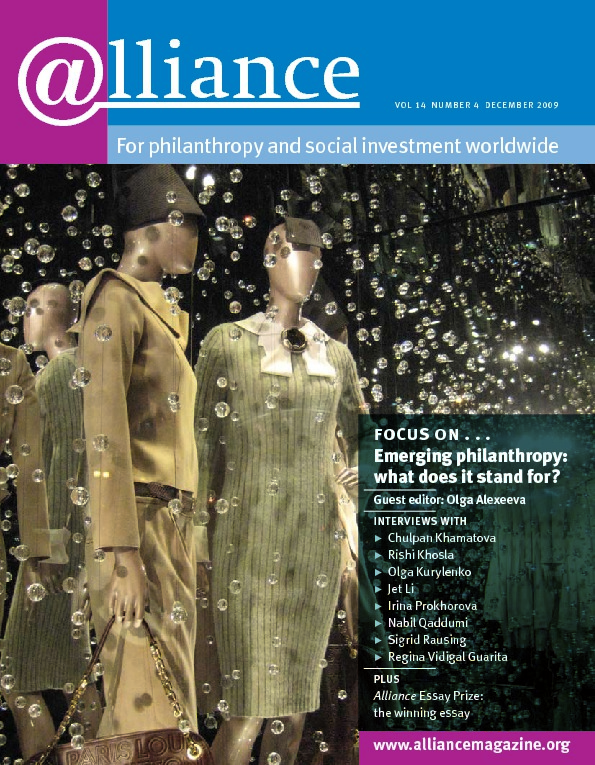Olga Alexeeva chooses a provocative fashion image to highlight the ways in which ‘new’ philanthropy may not be very different from the robber baron variety that emerged in the United States early in the 20th century. In that era, wealth created on the backs of exploited workers or through cartel business practices was used by elite families to start private foundations, which became role models for thousands of others. Consistent ethical standards were not the strong suit of those founding fathers.
To Alexeeva’s list of unethical or dubious practices among wealthy philanthropists today, we could add others from the global South: ‘wannabe’ philanthropists who get involved only when there is an opportunity to rub shoulders with former presidents and billionaires, or ‘monogram’ philanthropists who contribute to projects that carry their own name but refuse to collaborate or to support the good ideas of others.
Where I would take issue with her otherwise excellent analysis is in its focus on the upper classes. The sort of status-conscious noblesse oblige giving described in the salons of the rich certainly takes place all over the world. Those elites need to be confronted with the glaring hypocrisy of some of their actions. But from the perspective of the Muslim and Arab societies where I work, giving is more of a taken-for-granted practice infused throughout the culture. Ordinary people are moved both by their faith and by a sense of fairness to open their wallets to those less fortunate. A recent survey in Egypt conducted by Marwa Daly confirmed that the great majority of philanthropy comes from the middle classes, motivated by a desire to share with those less fortunate. Millions of dollars in contributions also come from remittances of Arabs abroad, largely professionals rather than the super-rich, who send money home to support worthy causes.
The problem with these forms of charity, as Alexeeva rightly notes, is that the act of giving is too often an end in itself rather than the beginning of assessing impact and asking whether beneficiaries are better off once the charitable gift has been used. But we should be careful not to set up bad-good dichotomies between charity and ‘new’ philanthropy. For one thing, the need for immediate aid to ameliorate the suffering caused by poverty, disease and disasters will always be with us. Giving that is motivated by what Alexeeva calls ‘tradition’ is an important first step along a continuum of awareness about inequality and social solidarity. A verse from the Quran makes the social justice dimension of all philanthropy clear: ‘From the wealth you have been given is a portion which is the right of the oppressed.’
I believe that this religious grounding in justice may be one of the reasons that philanthropy is making rapid strides across Muslim societies, especially among the young. While questioning old ways, Muslims are reinterpreting the modalities of giving to suit new realities. To give one example, a zakat category for obligatory giving (zakat is one of the five pillars of Islam) is payment to free a slave. For obvious reasons, that category had fallen into disuse for a century. But due to the creative efforts of women’s groups in Malaysia, ‘slavery’ has been reinterpreted to include forced prostitution, child pornography, and even the bondage that is inherent in illiteracy. As a result, major resources can now be mobilized for organizations that work to eliminate these social ills. It was done by building on tradition rather than abandoning it.
We are emerging (I hope) from a damaging political era in which Islam has been equated with political violence and Muslim giving with support for terrorism. It is easy to forget that the original form of sustainable philanthropy – a perpetual endowment or waqf – arose in Muslim communities centuries ago. A $100 million initiative to address global hunger and poverty was recently announced by the World Congress of Muslim Philanthropists. It is time to bury the Bush-era stereotypes.
Olga Alexeeva has alerted us to the essential quandary of a globalizing world: how to build on local cultural capital (rather than homogenize it) in order to address the challenges of inequality, suffering and exclusion. I like her coinage of ‘private social responsibility’ and hope the concept will spread throughout our field. It serves as a reminder that each individual is potentially part of the solution, but only if we align deeply ingrained attitudes and everyday behaviour with our lofty philanthropic aims.
Barbara Lethem Ibrahim is founding director of the John D Gerhart Center for Philanthropy and Civic Engagement at the American University in Cairo. Email bibrahim@aucegypt.edu





Comments (0)